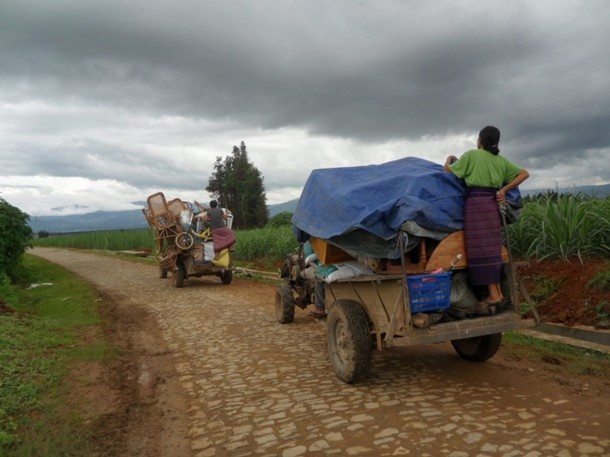The Chinese government is guilty of systematic human rights violations against Kachin refugees fleeing violence in Burma, including the denial of vital humanitarian assistance and forced repatriation, a new report by Human Rights Watch (HRW) has warned.
Up to 10,000 Kachins live in squalid, makeshift camps in Yunnan province without access to the legal protection or humanitarian aid prescribed by international refugee law, while fighting rages between Burmese troops and Kachin rebels across the border.
“Some Kachin refugee families have returned to Burma from Yunnan because of pressure from Chinese authorities or the lack of adequate humanitarian aid,” said the report. “There they are exposed to ongoing fighting, hostile Burmese army forces, and landmines that have been widely laid by both the Burmese army and the KIA [Kachin Independence Army].”
The Chinese government has authorised a small number of local NGOs and church groups to operate along the border, but continues to block international aid or monitors from entering the region and refuses to recognise any of the refugees.
As recently as May 2012, a government spokesperson dismissed the Kachin population as “border residents” who “come to visit friends and relatives.”
According to the report, refugees “remain in dire need of shelter, food, safe water and sanitation, non-food items, and health care.” It further accuses the government of exploiting Kachins through discriminatory and abusive practices.
“Most children have no access to schools. In search of income, adults seek day labor and are vulnerable to exploitation by local employers,” warned the report. “Other Kachin refugees have been subject to arbitrary roadside drug testing, arbitrary fines, and prolonged and abusive detention by the Chinese authorities, all without due process or judicial oversight.”
As a signatory to the 1951 Refugee Convention, HRW is adamant that China must do more.
“The Chinese government has generally tolerated Kachin refugees staying in Yunnan, but now needs to meet its international legal obligations to ensure refugees are not returned and that their basic needs are met,” said Sophie Richardson, China director at Human Rights Watch.
“China has no legitimate reason to push them back to Burma or to leave them without food and shelter.”
HRW has documented at least two bouts of refugees being refused entry or forced to return from China in June and November last year. “My aunt in Namhka tried to enter the China side in Nawngtaw,” explains an ethnic Lisu woman. “They all had passports but were turned away…[Chinese authorities] told them they are Burmese citizens and because of that they couldn’t enter.”
The threat of refoulement has led to widespread fear among displaced Kachins, whose villages have often been razed to the ground by Burmese troops.
“I don’t feel secure here at all because we are still on the border and too close to the Burma side,” a 25-year old refugee told HRW. “I worry as the fighting continues, if the Chinese don’t accept us, where will we go? Where can we live?”
The KIA’s refugee committee (IRRC) recently told DVB that until late April residents in Laiza regularly witnessed Chinese soldiers at the official border gate express open hostility to Kachins crossing the border.
“In the past when the situation got intense the soldiers at the border would practice pushing people away at the border using shields and sticks,” said Salang Kaba Doi Pyi Sa, head of the IRRC. “It was clearly to show that they would not accept refugees crossing into China.”
Since then Kachin officials and local Chinese authorities have informally discussed the possibility of resettling refugees into camps in Yunnan province. But as of yet no progress has been made and it remains unclear whether these plans have received sanction from Beijing, notorious for its silence – and some say tacit complicity – in the Kachin conflict.
In March, the Burmese army is reported to have crossed the border and executed a Chinese citizen, but even this elicited a measured response.
“We thought that this time the Chinese government would be angry,” May Li Aung from humanitarian NGO Wunpawng Ninghtoi (WPN) told DVB. “But instead they brought food rations to the Burmese soldiers.”
Local aid groups have continuously expressed concern about China’s recalcitrance as funding cuts precipitate a growing food and humanitarian crisis in the camps. All humanitarian supplies for displaced Kachins inside Burma must be smuggled across the border, while local authorities “look the other way.”
“The Chinese government is not only legally obligated, but fully capable of temporarily protecting Kachin refugees and meeting their basic needs,” Richardson said.
Violence between rebels and Burmese troops flared in June 2011 over a disputed territory near a Chinese-backed hydropower dam, ending a 17-year ceasefire. The Kachin Independence Organization cites concerns about large-scale development projects – largely dominated by Chinese economic interests – as a primary obstacle to durable peace.



